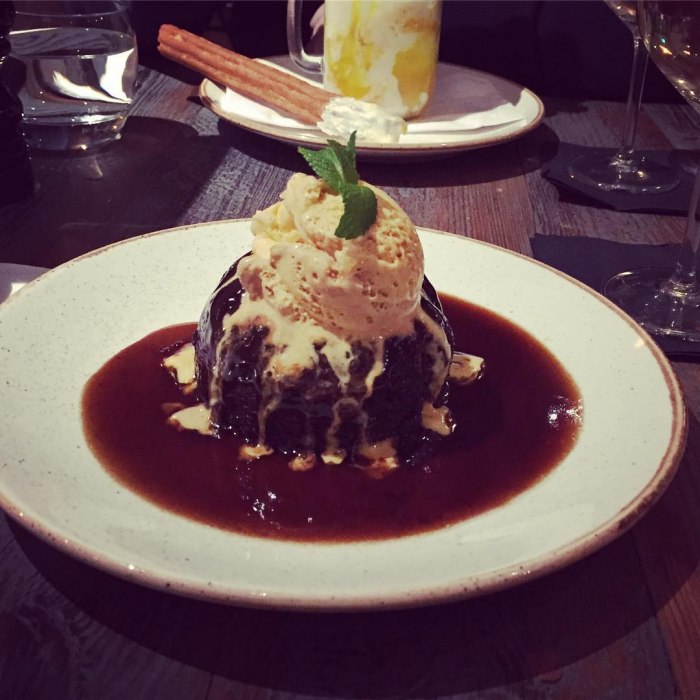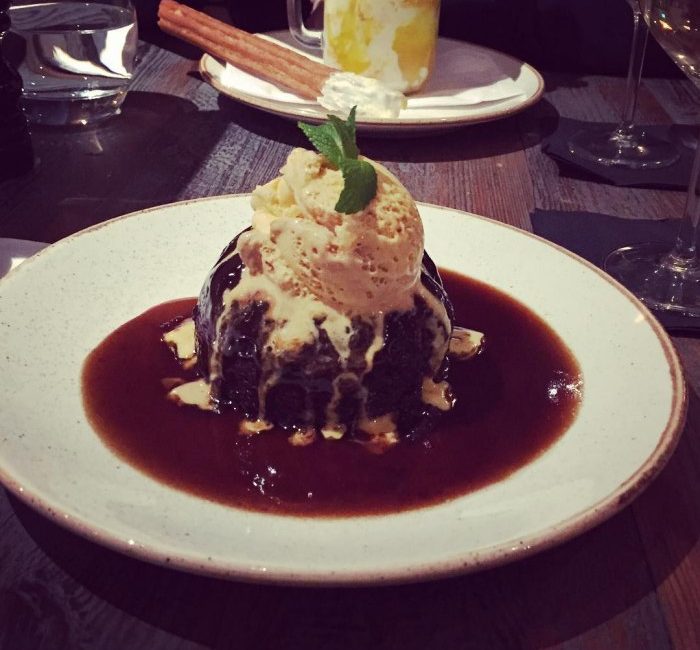Like our 12th-century Priory and the racecourse that runs directly by our Village Shop, we take great pride in the fact that Cartmel is the birthplace of Sticky Toffee. We began baking in the rear kitchen of our Village Shop more than 30 years ago, which is where Cartmel Sticky Toffee Pudding got its start.

Ingredients
- 225g Medjool dates
- 175ml boiling water
- 1 tsp vanilla extract
- 175g self-raising flour
- 1 tsp bicarbonate of soda
- 2 eggs
- 85g butter
- 140g demerara sugar
- 2 tbsp black treacle
- 100ml milk
- 1 scoop ice cream
- 175g muscovado sugar
- 50g butter
- 225ml double cream
- 1tbsp black treacle
Instructions
Stone and chop the dates quite small, put them in a bowl, then pour the boiling water over. Leave for about 30 minutes until cool and well-soaked, then mash a bit with a fork.
Stir in the vanilla extract. Butter and flour seven mini pudding tins (each about 200 ml / 7 fl oz) and sit them on a baking sheet.
Heat oven to 180C/fan 160C/gas 4. While the dates are soaking, make the puddings. Mix the flour and bicarbonate of soda together and beat the eggs in a separate bowl.
Beat the butter and sugar together in a large bowl for a few minutes until slightly creamy (the mixture will be grainy from the sugar).
Add the eggs a little at a time, beating well between additions. Beat in the black treacle, then, using a large metal spoon, gently fold in one-third of the flour, then half the milk, being careful not to overbeat. Repeat until all the flour and milk are used. Stir the soaked dates into the pudding batter.
The mix may look a little curdled at this point and will be like a soft, thick batter. Spoon it evenly between the tins and bake for 20-25 minutes, until risen and firm. Meanwhile, put the sugar and butter for the sauce in a medium saucepan with half the cream. Bring to a boil over medium heat, stirring all the time, until the sugar has completely dissolved.
Stir in the black treacle, turn up the heat slightly, and let the mixture bubble away for 2-3 minutes until it is a rich toffee colour, stirring occasionally to make sure it doesn’t burn.
Take the pan off the heat and beat in the rest of the cream. Remove the puddings from the oven. Leave in the tins for a few minutes, then loosen them well from the sides of the tins with a small palette knife before turning them out.
You can serve them now with the sauce drizzled over, but they’ll be even stickier if left for a day or two coated in the sauce. To do this, pour about half the sauce into one or two ovenproof serving dishes.
Sit the upturned puddings on the sauce, then pour the rest of the sauce over them. Cover with a loose tent of foil so that the sauce doesn’t smudge (no need to chill). When ready to serve, heat oven to 180C/fan 160C/gas 4. Warm the puddings through, still covered, for 15-20 mins or until the sauce is bubbling. Serve them on their own, or with cream or custard.








No Comment! Be the first one.